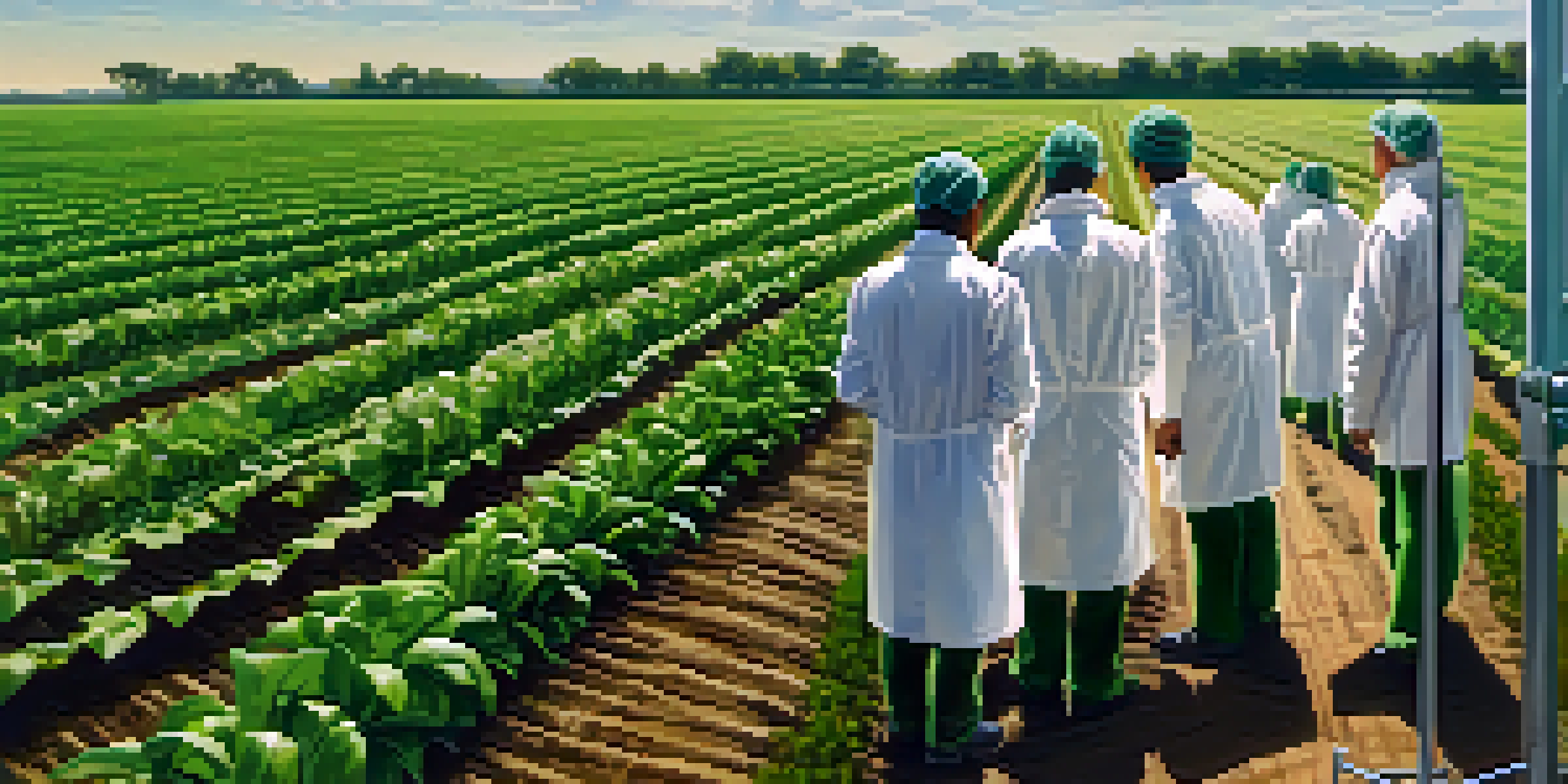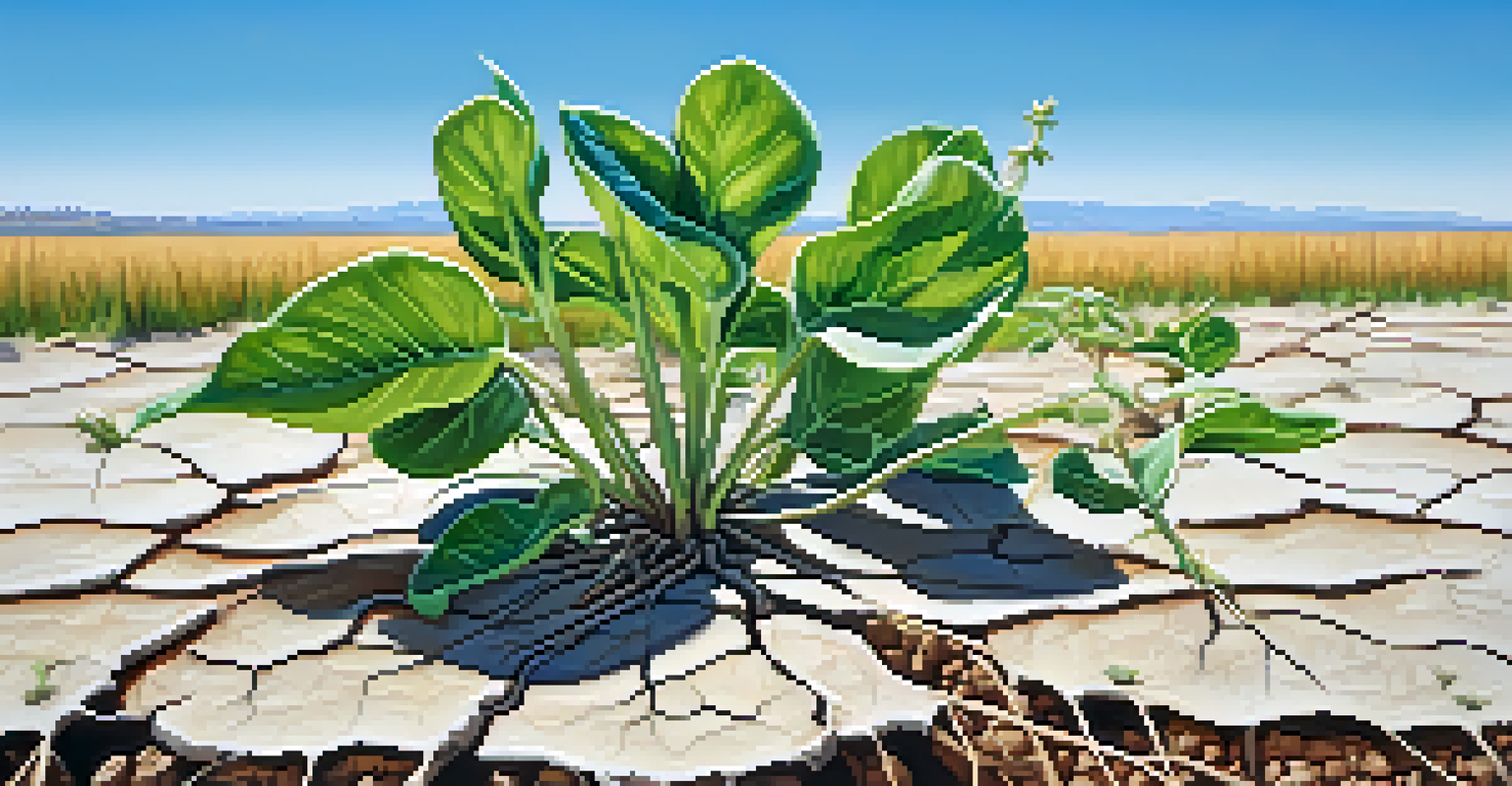Integrating Biotechnology in Plant Breeding for Stress Tolerance

Understanding Stress Tolerance in Plants
Stress tolerance in plants refers to their ability to withstand adverse conditions, such as drought, salinity, or extreme temperatures. These environmental stresses can severely impact crop yields and quality, making it crucial for agricultural sustainability. By enhancing stress resilience, we can ensure food security while minimizing the need for chemical interventions.
Plants are the earth's endless effort to speak to the listening heaven.
Plants respond to stress through various physiological and biochemical mechanisms. For example, some species have adapted to store water efficiently or develop deeper root systems. Understanding these natural adaptations lays the groundwork for incorporating biotechnological methods in plant breeding.
Moreover, breeding for stress tolerance is not just about survival; it's about optimizing growth and yield under challenging conditions. This focus on resilience means that farmers can cultivate crops that not only endure tough climates but also produce better harvests.
The Role of Biotechnology in Breeding
Biotechnology plays a transformative role in modern plant breeding, allowing scientists to enhance desirable traits more precisely and efficiently. Techniques like genetic engineering and marker-assisted selection enable breeders to identify and incorporate stress-tolerance traits from various plant species. This targeted approach can significantly shorten the time needed to develop resilient crop varieties.

For instance, scientists can introduce genes associated with drought resistance from wild relatives of crops into commercially viable species. This method not only improves the plant's resilience but also ensures that it retains other beneficial traits, such as taste and nutritional value. The end result is a crop that can thrive in adverse conditions while remaining appealing to consumers.
Plants Adapt to Environmental Stress
Plants possess natural mechanisms that enable them to survive harsh conditions such as drought and salinity, which is vital for agricultural sustainability.
Additionally, biotechnology can reduce the reliance on traditional breeding methods, which often take years to yield results. By harnessing the power of molecular tools, breeders can accelerate the development of stress-tolerant plants, addressing the urgent need for resilient crops in the face of climate change.
Molecular Techniques for Stress Tolerance
Several molecular techniques are pivotal in enhancing stress tolerance in plants. For example, CRISPR-Cas9 gene editing allows for precise modifications in the plant's DNA, enabling the introduction of specific traits without the introduction of foreign genes. This technique has gained popularity for its efficiency and accuracy, making it a game-changer in plant biotechnology.
Agriculture is our wisest pursuit, because it will in the end contribute most to real wealth, good morals, and happiness.
Another technique, RNA interference (RNAi), helps regulate gene expression by silencing unwanted genes that may hinder stress tolerance. By fine-tuning these genetic expressions, plants can better manage their responses to stressors, improving their chances of survival and productivity. These advancements are akin to giving plants a ‘smart’ approach to adapt to their environments.
Furthermore, genomic selection, which involves predicting the performance of plants based on their genetic makeup, allows breeders to select the best candidates for breeding programs efficiently. These molecular methods not only streamline the breeding process but also contribute to developing crops that can endure a variety of challenges.
Field Trials: Testing Resilience
Field trials are essential for assessing the effectiveness of biotechnologically developed crops in real-world conditions. These trials provide vital data on how stress-tolerant varieties perform under various environmental stresses. By observing these plants in diverse settings, researchers can gather insights that inform further breeding efforts.
During field trials, factors like yield, growth rate, and disease resistance are meticulously measured. For instance, a new drought-resistant variety may be planted alongside traditional varieties to compare their performances under similar stress conditions. This comparison helps identify which traits are most beneficial and worth pursuing in future breeding initiatives.
Biotechnology Enhances Crop Resilience
Modern biotechnological methods, like genetic engineering, allow for the precise breeding of crops with improved stress tolerance to meet the challenges of climate change.
Moreover, successful field trials offer invaluable feedback to both breeders and farmers, ensuring that the developed varieties meet the needs of agricultural practices. This collaborative approach fosters innovation and promotes the adoption of new technologies in farming communities.
Environmental Impacts and Sustainability
Integrating biotechnology in plant breeding has significant implications for environmental sustainability. By developing crops that can thrive in marginal soils or withstand drought, we can reduce the need for chemical fertilizers and irrigation. This not only conserves resources but also minimizes the environmental footprint of agriculture.
Moreover, stress-tolerant crops can help mitigate the effects of climate change on food production. As extreme weather patterns become more frequent, having resilient crops that can adapt to these changes is crucial for maintaining food security. This proactive approach can lead to more sustainable agricultural practices that benefit both farmers and the ecosystem.
In essence, the use of biotechnology in breeding not only enhances crop yields but also contributes to the overall health of our planet. By prioritizing sustainability in food production, we can create a win-win situation for agriculture and the environment.
Challenges in Biotechnology Adoption
Despite the promising benefits of biotechnology in plant breeding, several challenges remain in its widespread adoption. Public perception and regulatory hurdles often create barriers to the acceptance of genetically modified organisms (GMOs). Misinformation and fears about potential risks can hinder the progress of these innovative technologies.
Additionally, the cost and complexity of biotechnological methods can be prohibitive for small-scale farmers. Access to the necessary tools, training, and resources is essential for ensuring that all farmers can benefit from advancements in plant breeding. Bridging this gap is crucial for fostering inclusive agricultural development.
Field Trials Validate Crop Performance
Conducting field trials is essential to assess how biotechnologically developed crops perform under various environmental stresses, ensuring they meet agricultural needs.
Moreover, the potential for ethical concerns and biodiversity loss due to monoculture practices must be addressed. It’s important to ensure that biotechnological advancements do not compromise the diversity of our agricultural systems, which is essential for resilience against pests and diseases.
The Future of Stress-Tolerant Crops
Looking ahead, the future of stress-tolerant crops appears promising, thanks to the ongoing advancements in biotechnology. With increasing investments in research and development, we can anticipate the emergence of even more resilient crop varieties tailored to specific environmental challenges. This innovation is vital for meeting the growing global food demands.
Moreover, collaboration between scientists, policymakers, and farmers will be crucial for successfully integrating these new technologies into agricultural practices. By working together, we can create a supportive ecosystem that encourages sustainable practices and promotes the adoption of biotechnological innovations.

Ultimately, the integration of biotechnology in plant breeding for stress tolerance represents a significant step toward a more sustainable and resilient agricultural future. By embracing these advancements, we can better equip our food systems to thrive in an ever-changing world.